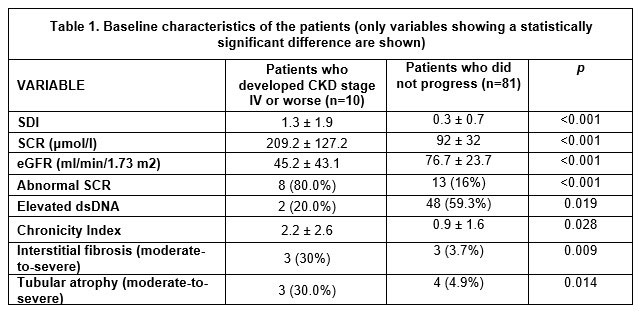Session Information
Date: Monday, November 14, 2022
Title: SLE – Diagnosis, Manifestations, and Outcomes Poster III: Outcomes
Session Type: Poster Session D
Session Time: 1:00PM-3:00PM
Background/Purpose: Mesangial lupus nephritis (LN class II) is generally considered benign with minimal potential for developing advanced chronic kidney disease (CKD). However, a certain proportion of such patients still develop advanced CKD and, eventually, end-stage renal disease (ESRD).
Objective: To describe the factors associated with the development of advanced CKD (stage IV or worse) in patients with LN class II.
Methods: Patients with mesangial LN based on kidney biopsy that was performed at or after enrollment to the clinic and at least 1 year of follow-up were retrieved from the Toronto Lupus Clinic longitudinal database. Biopsy was performed because of proteinuria (n=55), rising serum creatinine without proteinuria or active urinary sediments (n=24), active urinary sediment (n=6) and generalized lupus activity (n=6). Patients with ESRD at baseline were excluded. Individuals were followed over time for the development of advanced CKD. Descriptive statistics were used.
Results: Ninety-one patients were eligible of whom 10 developed advanced CKD during follow-up, 7 (7.7%) CKD stage IV (eGFR≦29ml/min/1.73m2) and 3 (3.3%) ESRD. Statistically significant differences in baseline characteristics are shown in Table 1 (all other demographic, clinical, serologic and therapeutic variables did not differ between groups).
In 81/91 patients (89%), there was no significant deterioration of the renal function after an average follow-up of 16.8±12.8 years. For patients with proteinuria, that was mild (1.17±0.89g, range 0.5-5g/day). Fifteen patients had a repeat biopsy during disease course. Histologic transformation was demonstrated in 10 (7 with proliferative nephritis, 2 with membranous and 1 with advanced glomerulosclerosis). Sixty-three patients (67.7%) had normal renal function while 18 (19.4%) had CKD stage III (eGFR=30-59ml/min/1.73m2) at last visit.
Seven patients developed CKD IV of whom 4 already had impaired kidney function at baseline whereas their proteinuria was mild (< 1g/day). Four patients had a repeat biopsy; 2 developed membranous nephropathy while there were no changes in the other two. Despite their advanced disease, their renal function remained stable (eGFR=24.2±4.3ml/min/1.73m2) after a mean of 18.5±8.5 years.
Three patients developed ESRD, all of whom had impaired kidney function at baseline (stage IV). Despite their advanced CKD, these patients developed ESRD after 8.6, 10.3 and 16.8 years from kidney biopsy respectively. Two of them had a repeat kidney biopsy that showed histologic transformation (one proliferative nephritis and one advanced glomerulosclerosis).
Conclusion: Advanced CKD (stage IV or worse) developed in 11% of our patients with mesangial LN but the progression was slow. In most cases, kidney function was already impaired at the time of the biopsy, while proteinuria was only mild. These findings imply that mesangial disease can occasionally lead to CKD and underlines the need for close monitoring of such patients with treatment that should not be based on the level of proteinuria alone.
To cite this abstract in AMA style:
TSELIOS K, Gladman D, Su J, Urowitz M. Mesangial Lupus Nephritis: Long Term Outcomes [abstract]. Arthritis Rheumatol. 2022; 74 (suppl 9). https://acrabstracts.org/abstract/mesangial-lupus-nephritis-long-term-outcomes/. Accessed .« Back to ACR Convergence 2022
ACR Meeting Abstracts - https://acrabstracts.org/abstract/mesangial-lupus-nephritis-long-term-outcomes/

